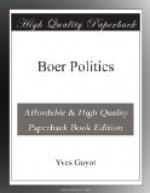“As to how far
and by what method, questions could be decided by a
judicial authority whose
independence, impartiality and capacity
should be above suspicion.”
Thus the constitution of a tribunal of arbitration was accepted by Mr. Chamberlain, and in his despatch of August 28th he directed Sir Alfred Milner to arrange a fresh conference with Mr. Krueger. On September 2nd the Pretoria Government asks whether the British Government will receive burghers of the Free State as members of the arbitration tribunal? which are the subjects it will be competent to settle? and which will be reserved?
Sir Alfred Milner’s views on this subject are stated in a lengthy despatch to the Government, dated September 8th. The points which Sir Alfred Milner considered should be excluded from arbitration as being likely to re-open discussion are the following: (1) The position of the British Indians; (2) the position of other British coloured subjects; (3) the right of all British subjects to be treated as favourably as those of any other country; “a right which has never been formally admitted by the South African Republic.”
Here the Arbitration Question may be said to have dropped, Sir A. Milner’s telegram of September 8th being followed by the ultimatum of October 9th.
Hence this question was not a new one at the time of the Bloemfontein Conference. It had been raised by the Government of Pretoria as a means by which its “inherent rights as a Sovereign State” should be acknowledged, a pretension which could not be admitted by the British Government.
As we have seen, however, arbitration was not absolutely refused by Mr. Chamberlain; he imposed two conditions; the Conventions of 1881 and 1884 were not to be questioned, foreigners were not to be chosen as arbitrators; the points referred to arbitration should be clearly specified.
There is a vast difference between this attitude and the arrogant tone generally ascribed to Mr. Chamberlain. It is always advisable to refer to the documents on a question before discussing it.
CHAPTER XVII.
THE BOER ULTIMATUM.[23]
1.—Dr. Kuyper’s Logic.
Referring to the Bloemfontein Conference, Dr. Kuyper says:
“Mr. Chamberlain opened his criminal negotiations ... Unfortunately for him, his opponent, of whom Bismarck said there was not a statesman in Europe who surpassed him for sagacity and sound judgment, did not fall into the trap. He prolonged the negotiations ... but from the moment he held in his hands undeniable proofs of the manner in which Mr. Chamberlain was luring him on and seeking to gain time, he hurled at him the reproach of “coveting Naboth’s vineyard,” and sent an ultimatum to London.” (p. 502).
We are struck in this passage by the admirable logic of Dr. Kuyper. It is Krueger who “prolongs the negotiations,” and Chamberlain who “seeks to gain time.” To heighten the prestige of Mr. Krueger, Dr. Kuyper invokes the testimony of Bismarck. I certainly think that it was Krueger’s ambition to become the Bismarck of South Africa, and President of the “Africa for the Afrikanders, from the Zambesi to Simon’s Bay.”




